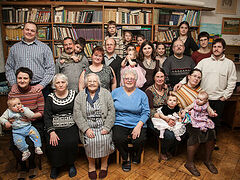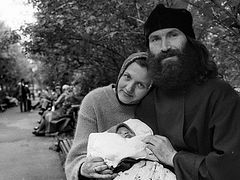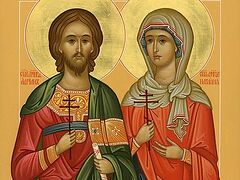In the Name of the Father, the Son, and the Holy Spirit:
My beloved Fathers, brothers and sisters, today we keep the sacred memory of the holy martyrs Adrian and Natalia, who suffered beautifully for the Lord in the early fourth century (during the reign of the Emperor Maximian). Called to holy martyrdom under the influence of the godless authorities, the young man Adrian — not yet thirty years of age — nobly accompanied 22 others destined for that glory; and his wife, also hardly more than a youth, fervently encouraged her husband to prove himself a true Christian in the manly acceptance of this yoke. Thus the public faith of the husband was encouraged by the secret faith of his wife (for her Life in Christ was secret, as so many were during those seasons of persecution), and through her consolation and encouragement, Adrian attained to the Passion of their Lord with willing joy.
Saints Adrian and Natalia have become, for the whole Body of Christ, images of the piety of Christian family. In the deeply broken and weak latter days of the present generation, when so much of the saving Gospel of Christ is abandoned and the nature of its life is made to feel so foreign, marriage and family have become tragically misunderstood. Because the demonic influences of the age teach man always to turn the power of love inwards, collapsing in upon itself rather than being sacrificially shared with others, after the model of the Divine One Who gives us love, these cornerstones of human life are made self-determinative and, ultimately, selfish. Marriage is taken to be about emotion and personal fulfilment; it is subjected to the plans and intentions of self-satisfying desires — one seeks marriage, if at all, only as a part of a ‘larger plan’ for life, when one is suitably financially stable, or secure in possessions, or in a career, and so on. And family, is made a thing manifesting self-centred desire: it might be anything one wants, as long as it is what one wants — the embodiment of an individual’s self-created picture of what humanity is like, and relations, and emotions, and goods.
But the Saints bear witness to us of a different reality. True family is not a creation of human society, nor less of any individual’s or couple’s design. True family is God’s creation, God’s gift. It is His bestowal upon those He has created for one another, of a life in which the ascent to godliness can be realised. It is an arena of ascetical growth, and transformation into the life of the Gospel — a life in which husband, wife, and whatsoever children as the Lord may grant them find in each other a divine help in the sacred and joy-creating task of growing into the eternal Life of the Creator. The family is sometimes called a ‘small Church’, because in it, as in the Church which is our mother, diverse members are united into one body that lives and breathes together; and, just as in the Church man receives directly the grace-bearing blessings of the Divine Mysteries, so in the family there is more than only the emotional love of man and woman, or the structures of protection and care of parent for child. In the family, God’s grace pours forth into the hearts of His creatures. A family is a means of direct encounter with the transformative Grace of Almighty God.
This is why marriage is a Sacrament of the Church. In Holy Communion we directly receive the divine presence of God. In Baptism, we directly receive God’s presence. And so in the other Mysteries; and indeed, so too in marriage. We do not pronounce a ‘vow’ in this Sacrament, because true marriage is not a contract or plan. Rather, we place crowns upon the heads of the bride and bridegroom, because what comes upon them in the Mystery of marriage is the divine grace to live a new life: the life of martyrdom into glory. And a crown is the sign of both. When Orthodox Christians think of crowns, we think of those conferred upon the holy martyrs in Paradise, as well as those laid upon the heads of kings. Through the divine Grace of marriage, a couple receives the power to martyrically attain the transfiguration of life that leads to royal glory in the Kingdom.
This is precisely the witness of Saints Adrian and Natalia. In the kondak for this godly example of pious marriage, we hear sung: ‘Having laid up in thy heart the divine words of thy divinely wise wife, O Adrian, martyr of Christ, thou didst earnestly rush to sufferings, receiving a crown with thy spouse.’ Both of these saints attained the Glory of God — and they did so by means of each other. The sacredness of their marriage became for them the source of divine strength; and through their words, their lives and their prayer, they lifted each other up into their Lord’s Kingdom.
My brothers and sisters, in their memory and through their heavenly intercessions, I call upon you all to cherish as a most precious gift from God the reality of true marriage and family in this world. Whatever may be the debasements of these things that we see in the secular world around us, let the Saints be for us the witnesses of reality. For those of you crowned in this glory, who are husbands and wives: hold fast to the sacredness of this mystical union. Be faithful to what the Lord has given you! Use it well! For those who look towards marriage in the future, seek even today to understand it aright, and to approach it with due awe and reverence, as a Divine Mystery that might bring you closer to your Saviour. And to each and everyone: honour your family — for we are all of us members of a family. Support each other’s families. Encourage in each other this life of shared ascetical devotion to God, Who will reward us all with the bounties of His love.
As is customary in our Church on the feast day of saints Adrian and Natalia, we will distribute at the end of the Divine Service white flowers: white as a sign of the purity of the Life in Christ to which our families are called to bear witness. And may these wonderful saints intercede for us and bless us all. Amen!




